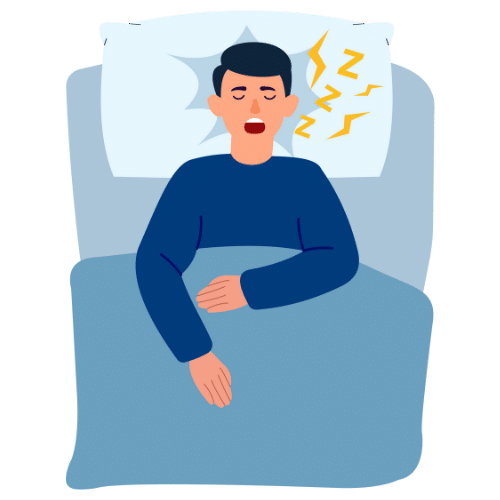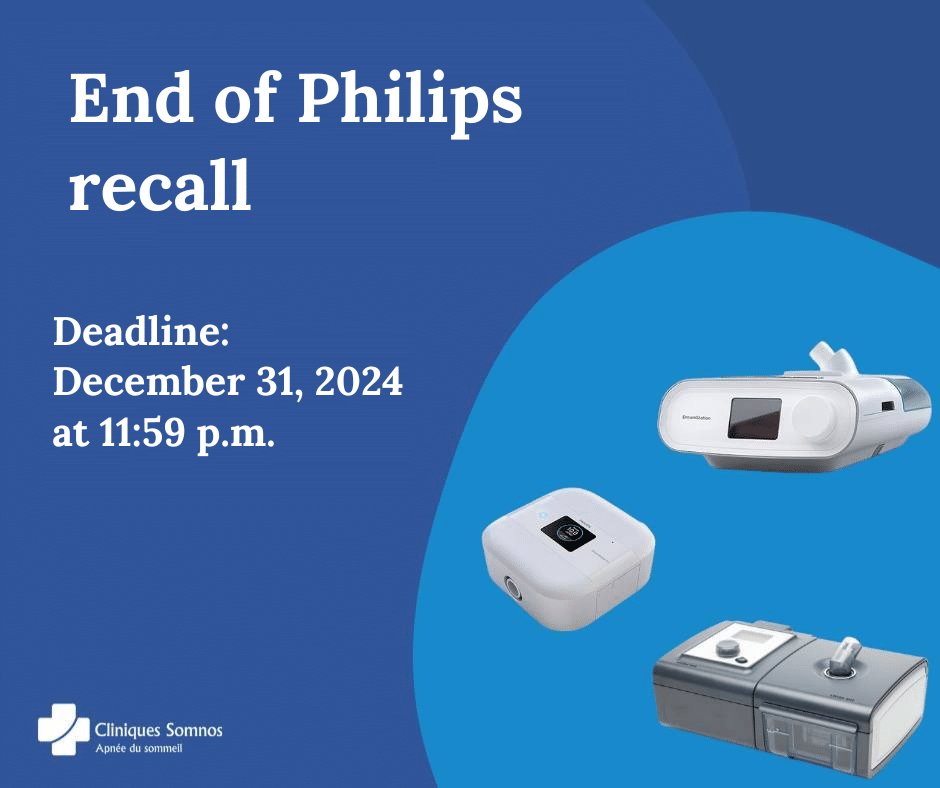It is a sleep disorder characterized by repeated breathing events, such as pauses or stops. During these episodes, there is often a drop in the oxygen level in the blood followed by the patient waking up (often unconsciously). The person then resumes breathing normally until the next episode.
This is not without consequences since mild or very serious problems can result (excessive sleepiness, mood changes, headaches, etc.). Appropriate treatment allows you to regain better physical and mental health.
Apnea can cause various side effects. Some patients may experience symptoms of apnea and be impacted by their daily activities while other patients will be asymptomatic. The most common symptoms are:
Certain factors can promote the development of sleep apnea.

The first step is a consultation with a healthcare professional. He will explain the equipment required for diagnosis and the testing process. You will receive this equipment to carry out the test comfortably at home.
This test records all essential parameters during an entire night's sleep. Subsequently, a pulmonologist will analyze your data to establish whether you have sleep apnea.
After analyzing the home test results, if a diagnosis of sleep apnea is made, CPAP (continuous positive airway pressure) treatment may be recommended. This treatment involves the use of a CPAP machine that provides a continuous flow of air to keep the airway open during sleep. The treatment is adjusted according to your specific needs to ensure restful and healthy sleep.
There are three types of sleep apnea:
1- Obstructive sleep apnea (OSA): linked to obstruction of the upper airways, this is the most common type as well as the most serious. Soft tissues in the palate, throat, or tongue can block airflow when a person has difficulty breathing.
2- Central sleep apnea: a rare form caused by a problem in the central nervous system, in which the respiratory center of the brain responsible for breathing breaks down.
3- Mixed apnea: A combination of obstructive and central apnea, many researchers believe it is also the most common. This is because a person with obstructive apnea often tends to breathe rapidly when recovering from an episode of obstructive apnea, which lowers the level of carbon dioxide in the blood, which can trigger an episode of obstructive apnea. central apnea.
It's possible that your snoring is the result of obstructive sleep apnea (OSA), as it is a common symptom of sleep disorders. OSA is caused by the narrowing or collapse of the upper airway during sleep and causes a series of pauses in breathing - sometimes up to 300 times in one night! This can have a significant impact on the quality of your sleep, and many experience headaches and difficulty concentrating during their waking hours.
Le ronflement se produit lorsque les voies respiratoires ou le passage par lequel nous respirons sont partiellement bloqués ou obstrués. Le rétrécissement des voies respiratoires induit ainsi des vibrations du voile du palais et un ronflement s'ensuit.
In many situations, this trade-off is minor and the body continues to receive sufficient amounts of oxygen to cause little or no harm. However, this is a red flag as it could also be one of the warning signs or part of sleep apnea. Most people with sleep apnea snore between episodes of apnea or interruption of oxygen. A sleep study should be performed to determine the severity of the person's condition.Common side effects of patients with sleep apnea include:
If overweight and obese people lose weight, sleep apnea and other health problems (like heart disease) decrease. Losing as little as 10% of your body weight can have a significant effect on sleep apnea symptoms.
A home sleep apnea test is a very simplified breathing monitor that tracks your breathing, oxygen level, and breathing effort while you wear it. It does not fully capture what is monitored by a nighttime sleep study. The nighttime sleep study provides a more in-depth assessment of sleep problems.
If you suffer from chronic snoring loud enough to wake a bed partner, talk to your doctor.
Subscribe to our newsletter
